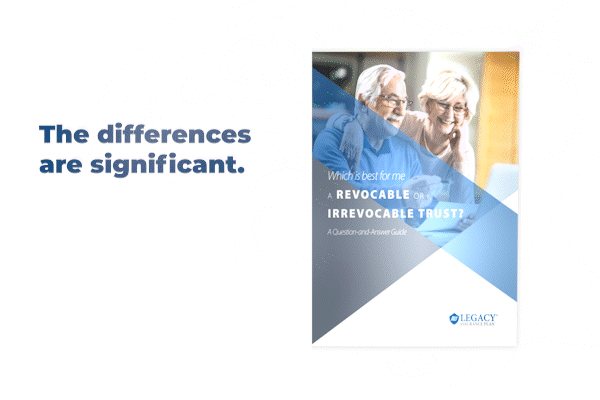The revocable living trust is arguably the most popular estate planning tool. It's a great way to plan for the management and distribution of your assets at your own disability or death while still retaining full control over your assets during your life. Yet, some Americans include additional trusts as part of their estate plan in order to achieve added benefits, such as eliminating estate tax issues. One additional trust that many individuals include in their estate plan is the irrevocable life insurance trust.

Estate planning is all about planning for the future. Discussing long-term care, financial plans and other wealth strategies is crucial to ensure your particular goals are achieved. One important tool often underutilized is life insurance. Life insurance is a great way to provide your family with easy access to liquidity following your death. Typically, you take a policy out on your life and then the death benefit will pay outright to the primary beneficiary listed on the policy.
The problem many American's have with this is that they cannot then prevent the beneficiary from overspending - typically an issue with young or irresponsible children. Other individuals are concerned that the large death benefit will contribute to an increase in their estate size and cause an estate tax issue to arise. Although the revocable living trust is a foundational planning device that can achieve most client's goals with respect to planning for their future, it's not a bad idea to consider an additional trust in your estate plan: an irrevocable life insurance trust.
What is an irrevocable life insurance trust?
An irrevocable life insurance trust (ILIT) is an irrevocable living trust created to hold a life insurance policy. Unlike the revocable living trust, an irrevocable trust cannot be modified or revoked (you also relinquish all control over any assets held in an irrevocable trust). The ILIT can either purchase the life insurance policy on your life or you may transfer an existing policy to the trust, but once the transfer is completed you will no longer have the ability to modify or change the terms of the policy.
How does an ILIT function?
There must be a grantor (this is typically you), a trustee and beneficiaries - three key components to creating a valid trust. The grantor (also known as the settlor) is the creator of the trust. They are responsible for selecting the trustee, naming the beneficiaries and creating the terms of the trust. The trustee is responsible for managing and/or distributing the trust assets and the listed beneficiaries are who will inherit the policy proceeds. Once the ILIT is successfully created and funded with life insurance, the ILIT will become the owner of the life insurance policy and will pay the premiums. The trust is listed as the policy's primary beneficiary so that, when you die, the proceeds will then be held in trust. The trustee that you have selected would then use their discretion and manage or distribute the proceeds to the listed individual(s) and in accordance with the trust terms. These policy proceeds will not be included in your estate value and will not be subject to the probate court.
Why should I consider creating an ILIT?
Tax relief - One of the main benefits of creating and properly funding an ILIT is reducing or eliminating federal estate tax. Although the estate tax exemption increased to $12.06 million per person in 2022, it has been as low as $5.35 million in the past. If the size of your estate exceeds the federal exemption rate at your death, the excess will be subject to a high tax. An ILIT is a great technique for those estates that may exceed the federal tax exemption. By moving the policy proceeds into an ILIT, in which you are no longer the owner of the policy, you have effectively moved the asset out of your estate. This will reduce the overall estate size which is how you will either avoid reduce or eliminate a potential estate tax issue.

Liquidity - Life is expensive and additional costs may arise at your own death. Life insurance proceeds can provide liquidity to your family in a time of need without the hassle of having to liquidate or sell off any assets. They can have access to cash to cover funeral expenses, outstanding tax bills, a mortgage or other debts.
Protection - Money left in an irrevocable trust to the beneficiaries comes with creditor protection. You can rest assured that the ILIT proceeds will not be subject any creditors you may face during your lifetime nor will they be subject to creditor claims of the intended beneficiaries.
Disadvantages of creating an ILIT and other potential issues that may arise
Irrevocable - The idea of relinquishing control over any of your assets during your lifetime likely makes you uncomfortable. With an irrevocable trust, once the terms are set they cannot be modified and the trust cannot be terminated. The ILIT will then own the life insurance policy and you will not be able to change beneficiaries of the trust or in any way amend the policy.
Incidents of ownership - Issues arise when the grantor of an ILIT will attempt to retain rights to either amend the trust or modify the policy in some way. In order for the ILIT to be effective, the grantor must not show any signs of ownership, or what is called “incidents of ownership.” In fact, the trustee must also not be the beneficiary or else this same issue will arise. There can be no power of attorney over the trust or policy - nothing allowing the grantor to reserve a right to change a listed beneficiary or to modify the life insurance policy. Otherwise, the ILIT strategy will fail and the life insurance policy proceeds will become part of your taxable estate or (assuming your trustee was also your beneficiary) your beneficiary's creditor protection will cease to exist.
Tax burden - While the ILIT is a great technique for those estates that may exceed the federal tax exemption, it could create a tax issue for future generations. Funding the ILIT with the life insurance proceeds has taken this asset out of your estate and eliminated your tax burden but it has now become part of the beneficiary's taxable estate. If the value of the proceeds is great enough to push the beneficiary's taxable estate beyond the federal exemption, then their estate will be subject to federal estate tax.
Is the ILIT right for me?
The best way to know if an ILIT is the way to accomplish your current goals is by visiting an experienced estate planning attorney's office. Be sure to be open and honest regarding your assets and overall estate size, familial goals, and personal goals. While the revocable living trust may be able to accomplish most of your goals, including an ILIT may be necessary as an additional planning tool if you're seeking to avoid estate tax, provide extra protections for beneficiaries or offer additional liquidity to loved ones following your passing.



